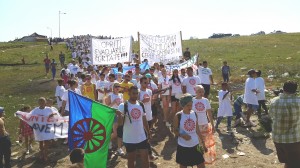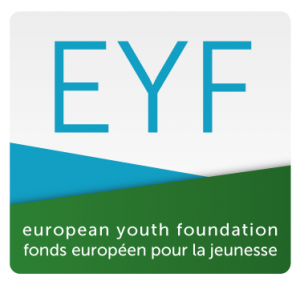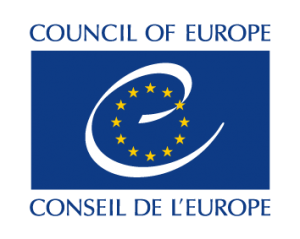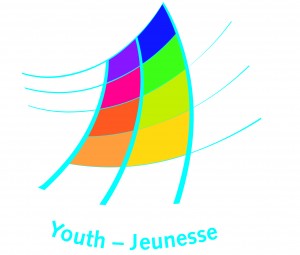 The Roma solidarity march „City for the people, not for profit”, dedicated to victims of forced evictions, will take place in Cluj-Napoca on 17 July 2015 as a cultural-civic action, part of the “So Keres, Europa?! – Changemakers’ week in Cluj-Napoca. Young Roma and Non-Roma Claim their Space in Europe” event. Such forced evictions are carried out in our city, as well as in many localities in Romania and Europe. Our event is a solidarity march against forced evictions carried out by public authorities, which dispossess people of their housing without consultation and without securing them with decent alternative housing.
The Roma solidarity march „City for the people, not for profit”, dedicated to victims of forced evictions, will take place in Cluj-Napoca on 17 July 2015 as a cultural-civic action, part of the “So Keres, Europa?! – Changemakers’ week in Cluj-Napoca. Young Roma and Non-Roma Claim their Space in Europe” event. Such forced evictions are carried out in our city, as well as in many localities in Romania and Europe. Our event is a solidarity march against forced evictions carried out by public authorities, which dispossess people of their housing without consultation and without securing them with decent alternative housing.
The Roma Solidarity March „City for the people, not for profit” starts from Pata Rât, the garbage dump area of the city of Cluj, which hosts, along with 1000 people from Dallas, the garbage dump and from Cantonului Street, 76 families who have been forcibly evicted on 17 December 2010 from Coastei Street. With this march we commemorate four years and a half since that expulsion, which mostly affected Romanian Roma and we express our solidarity with all victims of forced evictions in the city, in Romania and in other countries.
The Roma Solidarity March „City for the people, not for profit” is a march against racism and against housing injustice suffered by people deprived of their social and economic rights.
Through the Roma Solidarity March „City for the people, not profit”, Romanian Roma continue to fight for housing rights of all Romanian and European citizens, and are supported by many organizations and people from and beyond Cluj. The march calls upon the local, county, national and European authorities to remind them that the right to housing is a fundamental human right. In Romania, in the last two decades, it has been restricted by a political economy and a politics of development promoted by the state institutions, which chose to support the real estate investors to the detriment of citizens. Estate business pushed to the margins of society hundreds of thousands of people across the entire country. The tenants evicted from restituted buildings, or from the apartments of older blocks of flats or worker dormitories privatized from one day to another, or from social housing on lands whose estate value increased over night as a result of urban development plans created to favour estate investors, as well as people who do not have the resources to buy or rent housing at market value, have already or could become homeless given that the state ceased to secure their right to housing.
The Roma Solidarity March „City for the people, not for profit” starts from Pata Rât Cluj-Napoca. Over decades „the Pata (stain) of Cluj” formed as a residential area of people evicted in consecutive waves from Cluj among others through administrative measures of local public authorities. The latter associated therefore the larger space of the garbage dump with people treated as waste residues of a society completely subjected to the ideology and rules of the market economy. The racism practiced against Roma justified these expulsions in front of majority population by supporting the idea that Roma belong next to garbage. Public authorities did not take into consideration the existence of people at the garbage dump who worked in the selection process of waste residues for the last four decades. At the same time, they constantly refused to provide a legal status to the people that found shelter in Dallas/Pata Rât, otherwise they would have needed to recognise them as citizens with rights. Furthermore, through decisions of the Municipality and/or of the Local Council regarding the („temporary”) placement, either as group or individually of some „housing with social status” in that area, they created the „Numberless Cantonului Street” as well as its inhabitants, people evicted from town (from Avram Iancu street, Calea Turzii, Kővári Street, Byron Street, and other areas), as people „without domicile”, so them as well without rights. And in December 2010, 200 meters away from the chemical waste dump of Pharmaceutical Company Terapia, and 800 meters away from the garbage dump, they gave for use the modular houses built with public money to the people rendered „homeless” following their eviction from social housing on the former Coastei Street. The housing uncertainty characterizes also inhabitants of other residential areas in Cluj, for example Stephenson Street.
The Roma Solidarity March „City for the people, not for profit” invites the population of the city of Cluj to a cultural-civic action which fights for the housing rights of all citizens. Citizens and representatives of the public authorities: join us so that nobody suffers the humiliation of being treated „as garbage”! Take part to this march so that we can together claim back housing rights in the city of Cluj. The local public authorities must admit that we all belong to this city: all our rights are in this city. Together, Romanian citizens of all ethnicities and any social status, we call on the local authorities to recognise the right to city through policies that support our contribution to its development by providing our housing rights!
Through Roma Solidarity March „City for the people, not for profit”, those that ended up in Pata Rât with or without their consent, together with other citizens of the city of Cluj and their supporters from Romania and other European countries, we demand to the local, county, national and European authorities the following:
- measures for increasing the public housing stock;
- measures to guarantee the access of marginalised people to adequate social housing;
- prohibition of forced evictions;
- measures to legalize informal housing, including financial support of initiatives to legalize informal housing;
- control of rent on the private housing market;
- measures to protect people who work informally in the waste industry and in other economic fields;
- measures to recognise the labour of those who work for the minimum guaranteed wages as labour regulated through contracts that secure all their related rights (including the right to social housing);
- plans of measures for the socio-territorial desegregation included into the development strategy of the locality, supported from local budget.
The Roma Solidarity March „City for the people, not for profit” will take with it from Pata Rât a commemorative plaque in the memory of the 300 Roma, victims of the forced eviction carried out by the public local authorities in December 2010. We wish to place this commemorative plaque on Coastei Street from where they have been expulsed. This commemorative plaque is a symbol of solidarity with all people and families from Cluj who have gone through similar experiences during the last 25 years and ended up on the garbage dump, in Dallas and on Cantonului Street. With it we express our solidarity with all people, Roma and non-Roma, from Cluj, Romania and other countries that are affected by housing insecurity and dislocations of all kinds. We call on the Municipality of Cluj-Napoca, the Archibishopry of Valea Feleacului and Cluj, as well as the Babeș-Bolyai University to support us for the placement of this commemorative plaque on the building of the Teology Faculty of the Babeș-Bolyai University built on the area of Coastei Street, from where, on 17 December 2010, 300 Romanian citizens, the majority Roma, were forcibly evicted and moved to Pata Rât, near the city’s garbage dump.
17.07.2015, Cluj-Napoca
Asociația Comunitară a Romilor din Coastei – Cluj
Locatarii de pe strada Cantonului – Cluj
Locatarii de pe strada Stephenson – Cluj
Fundația Desire – Cluj
Uniunea Civică a Tinerilor Romi din România
Romano Suno – Cluj, Romania
Frontul Comun pentru Dreptul la Locuire – Cluj
Centrul Raţiu pentru Democraţie – Romania
Asociația Nevo Parudimos – Romania
Uco Dikhipen – Romania
Asociatia Go Free – Romania
Changemakers’ Movement
Phiren Amenca International Network – Hungary and Belgium
ternYpe International Roma Youth Network – Belgium
Roma Active Albania – Albania
RGDTS nonprofit kft – Hungary
Association of Young Roma – Slovakia
Romano Centro – Austria
Nakeramos- Spain
Kali Zor – Spain
FAGIC – Spain
Roma Youth Centre – Macedonia
Minority Voice – Serbia
Centre for European Initiatives – Bulgaria
Amalipe – Bulgaria
Czulent Jewish Association – Poland
Museum of Romani Culture – Czech Republic
CSD Diaconia Valdese – Italy
Amaro Drom – Germany
Nevo Drom – Ukraine
The Roma Solidarity March took place in the frame of the transnational project “So Keres, Europa?! What’s up Europe?!” (Social Forum of the Roma Youth Movement) coordinated by Phiren Amenca International Network and its partners and supported by the European Youth Foundation of the Council of Europe, and the “Europe for Citizens” Programme of the European Commission.
Photo Gallery






























